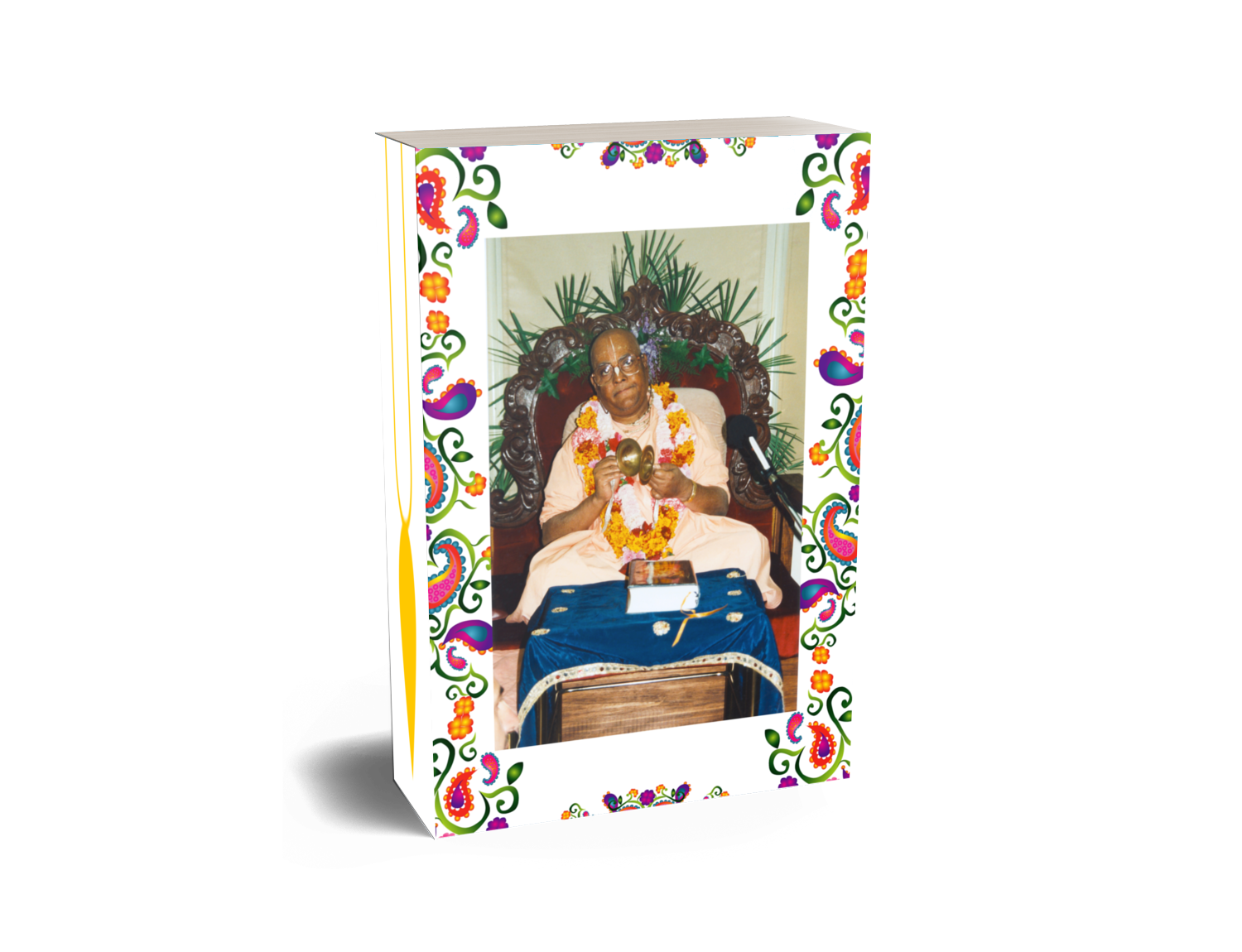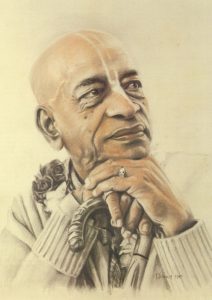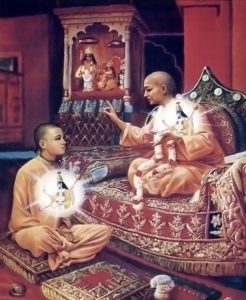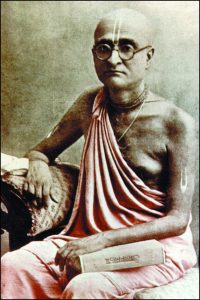
 The following is a transcription of a private darśana given in Śrīla Gaura Govinda Svāmī Mahārāja’s hut after an initiation ceremony in Bhubaneswar, India, on 26 November, 1989, published in Ananda Sambada Newsletter Volume 4 Issue 1 February 2002
The following is a transcription of a private darśana given in Śrīla Gaura Govinda Svāmī Mahārāja’s hut after an initiation ceremony in Bhubaneswar, India, on 26 November, 1989, published in Ananda Sambada Newsletter Volume 4 Issue 1 February 2002
Devotee 1: You were talking about sādhu-nindā, an offence to a pure devotee as one of the offences to the holy  name. Just for clarification, I wondered if this at all included neophyte devotees… if one is blasphemous towards a neophyte devotee, does this also have some effect on the holy name?
name. Just for clarification, I wondered if this at all included neophyte devotees… if one is blasphemous towards a neophyte devotee, does this also have some effect on the holy name?
Śrīla Gaura Govinda Svāmī Mahārāja: Sādhu-nindā? Number one (offence)… ‘sādhu’ means he is a completely surrendered soul. He has completely dedicated his life to spreading the holy names throughout the world. He is a pure devotee. Do you understand? He is a sādhu.
Devotee 2: Gurudeva, what happens then if one commits an offence to a junior devotee? A neophyte devotee, what happens in that case?
Śrīla Gaura Govinda Svāmī Mahārāja: You see, we have an instruction, ‘one who is an ignorant fool, have mercy upon him.’ You see he doesn’t know all these things, so he is committing such a thing, such a blunder or mistake. So a Vaiṣṇava showers mercy upon him. One who is not an ignorant fool, who knows something, who has some knowledge, is an offender. Māyāvādī impersonalists who blaspheme Vaiṣṇavas, śāstra – there is a class of … an organisation named (inaudible), Brahma-kumārīs, like that, they don’t accept śāstra, so they come under this category; they are committing an offence, they are not ignorant fools, they are just presenting some different philosophy, all concocted, not based on śāstra – so one should avoid them. We should not listen to them, we should not stay in contact with them, and Vaiṣṇavas should avoid them. Those who are Vaiṣṇavas, devotees of Kṛṣṇa should not be friends with them. This is how to deal with certain persons.
Devotee 1: It seems that sometimes in our dealings as young devotees we fall into the habit of criticising another young devotee… criticising each other. Sometimes we fall into this habit. We were wondering if this also affects the chanting of the holy name.
Śrīla Gaura Govinda Svāmī Mahārāja: There are two things, one who is guru – a spiritual master must find  fault for correction’s sake. He has that right, do you understand? Because he is guru, his business is to correct. They are committing some mistakes and blunders, offences. He is there to correct us, and teach us. Only he has that right. And those who are on his level, like gurus, as good as gurus, godbrothers of guru – known as guru-janas, they may also for correction’s sake. That is not criticism, that’s all good for us. But those who are of equal level, they sometimes play jokes… they mainly joke (amongst themselves). But others should not in any way. Those who are juniors have nothing to say to their seniors. No. Otherwise they will commit an offence.
fault for correction’s sake. He has that right, do you understand? Because he is guru, his business is to correct. They are committing some mistakes and blunders, offences. He is there to correct us, and teach us. Only he has that right. And those who are on his level, like gurus, as good as gurus, godbrothers of guru – known as guru-janas, they may also for correction’s sake. That is not criticism, that’s all good for us. But those who are of equal level, they sometimes play jokes… they mainly joke (amongst themselves). But others should not in any way. Those who are juniors have nothing to say to their seniors. No. Otherwise they will commit an offence.
Devotee 3: Regarding the first offence, you mentioned in class – blaspheming a Vaiṣṇava who has dedicated his life to the propagation of the holy name of the Lord. So sometimes we may see some senior devotees in leadership positions, and they might make some mistake, in our eyes apparently something is wrong, so we cannot say anything to them, should we just turn a blind eye – should we mentally just ignore that?
Śrīla Gaura Govinda Svāmī Mahārāja: One thing is there, if you notice something that is contradictory to the Vaiṣṇava principles, Vaiṣṇava etiquette, behaviour… like that, we cannot ignore it. It is better to speak with one of  his intimate friends and let him tell him. Or if you have access to him, you go there pay obeisances and with humility you may also tell… ‘I may be excused if I am committing some offence, it may be my ignorance, still I noticed something which gives me some pain in my heart, distress in my heart, so I have come to you to tell it. If it is my ignorance you may please excuse me or if it is a fact it is better, this is my request to you, please think it up seriously and correct yourself. It is also stated if guru does something (wrong) the disciple has the right to say also. Quoting authority, the disciple also has the right to tell his guru, ‘Guru Mahārāja, I am an ignorant fool but still I noticed such and such thing, will you please explain to me whether it is bona fide Vaiṣṇava etiquette. Or if it is not, please with my full obeisances to you, I pray to you please amend yourself.’ Confidentially tell him. That a disciple can also do. If in spite of all these things, the concerned Vaiṣṇava or guru doesn’t mend himself, then he can be rejected. This is our Vaiṣṇava etiquette.
his intimate friends and let him tell him. Or if you have access to him, you go there pay obeisances and with humility you may also tell… ‘I may be excused if I am committing some offence, it may be my ignorance, still I noticed something which gives me some pain in my heart, distress in my heart, so I have come to you to tell it. If it is my ignorance you may please excuse me or if it is a fact it is better, this is my request to you, please think it up seriously and correct yourself. It is also stated if guru does something (wrong) the disciple has the right to say also. Quoting authority, the disciple also has the right to tell his guru, ‘Guru Mahārāja, I am an ignorant fool but still I noticed such and such thing, will you please explain to me whether it is bona fide Vaiṣṇava etiquette. Or if it is not, please with my full obeisances to you, I pray to you please amend yourself.’ Confidentially tell him. That a disciple can also do. If in spite of all these things, the concerned Vaiṣṇava or guru doesn’t mend himself, then he can be rejected. This is our Vaiṣṇava etiquette.
Devotee 3: Sometimes a leader in the temple may make a decision, but you may feel it’s not right, it’s a wrong decision, so is it okay not to take part in that?
Śrīla Gaura Govinda Svāmī Mahārāja: One thing is there, when you are in the temple, there is the temple  authority. He is appointed by the spiritual master. And you have to work under him, so you have to obey him – carry out his orders. Sometimes you may feel that he gives such orders which are not congenial to Vaiṣṇava etiquette, so there is some defect, but first you have to carry it out, do not disobey him, but afterwards, it should be told. If the person concerned doesn’t accept it, then you will contact your spiritual master and you have to take his decision and act accordingly. This is our system.
authority. He is appointed by the spiritual master. And you have to work under him, so you have to obey him – carry out his orders. Sometimes you may feel that he gives such orders which are not congenial to Vaiṣṇava etiquette, so there is some defect, but first you have to carry it out, do not disobey him, but afterwards, it should be told. If the person concerned doesn’t accept it, then you will contact your spiritual master and you have to take his decision and act accordingly. This is our system.
Devotee 2: For someone in the temple they should follow this etiquette, whatever the leader says, but what about one who is a householder and lives outside, but may visit the temple every day to attend the programs? Are they also obliged to follow like that?
Śrīla Gaura Govinda Svāmī Mahārāja: You see householders coming to attend maṅgala-ārati or Bhāgavatam class or render some service, they are not full-time devotees. So temple authorities should give them some directions, ‘Alright you are doing this seva, service, like that – very good, but if you do it this way it will be better.’ They may give some instructions but they cannot impose, because you live outside, you don’t depend upon the temple. They are not maintaining you – they may request you to do some service, or give some instructions. That they may do. And as a Vaiṣṇava, you should comply with it.
Devotee 4: Although Kṛṣṇa consciousness, or Iskcon is a bona fide movement still we find politics and bad relations between devotees – why is it like this?
Śrīla Gaura Govinda Svāmī Mahārāja: Because those who do take part in it, are neophytes. They are not true Vaiṣṇavas.  A Vaiṣṇava does not take part in politics. Bhaktisiddhānta Sarasvatī Gosvāmī Mahārāja says, ‘Simplicity is Vaiṣṇavism’. Politics means crookedness, no simplicity. So on this path of devotional service, there is no question of politics at all. A true vaiṣṇava is simple – simplicity is Vaiṣṇavism. Politics means it is not Vaiṣṇavism – it’s politics. If something goes on like that, if someone is doing, let him do – as you sow so shall you reap. We should not take part in it. Just mind our own business, service, and chanting. Leave that place. A great vast world is there – serve anywhere… Gaurāṅga Mahāprabhu is there. If you are fixed in your consciousness, in your service, completely surrendered, nobody will be able to do you any harm. Kṛṣṇa will protect you. Mahāprabhu will protect you. They will punish those who try to do you any harm. Sooner or later, they will be punished by Them. Definitely. And it will take place – I have seen it in my own personal experience.
A Vaiṣṇava does not take part in politics. Bhaktisiddhānta Sarasvatī Gosvāmī Mahārāja says, ‘Simplicity is Vaiṣṇavism’. Politics means crookedness, no simplicity. So on this path of devotional service, there is no question of politics at all. A true vaiṣṇava is simple – simplicity is Vaiṣṇavism. Politics means it is not Vaiṣṇavism – it’s politics. If something goes on like that, if someone is doing, let him do – as you sow so shall you reap. We should not take part in it. Just mind our own business, service, and chanting. Leave that place. A great vast world is there – serve anywhere… Gaurāṅga Mahāprabhu is there. If you are fixed in your consciousness, in your service, completely surrendered, nobody will be able to do you any harm. Kṛṣṇa will protect you. Mahāprabhu will protect you. They will punish those who try to do you any harm. Sooner or later, they will be punished by Them. Definitely. And it will take place – I have seen it in my own personal experience.
Devotee 1: You were saying how we should chant every day without fail, and sometimes we find we get very sick, and it’s extremely difficult to finish your number of rounds…
Śrīla Gaura Govinda Svāmī Mahārāja: Yes. At that time you just request anybody that he should chant and you hear. When I was so sick, I couldn’t chant with my mouth, but for 24 hours I was listening to ‘Hare Kṛṣṇa’. I instructed the disciple who attended to me to always chant Hare Kṛṣṇa, so day and night 24 hours chanting was going on, and I was just listening to it.
And Prabhupāda did like that, he taught us like that. When he was sick chanting was always going on. I had no sleep at all – I could not sleep. The doctor gave me sleeping pills but still there was no sleep. Only two days I slept – the day the operation took place an anesthetic was given so I slept, I was unconscious. Another day also I couldn’t sleep, I felt so uneasy. But I was always listening to Hare Kṛṣṇa, day and night. Disciples would attend to me in turns and would chant. Listening and remembering, bas.
Image/Art made possible by Pixabay.com, Krishnapath.org and/or Bhaktiart.net








